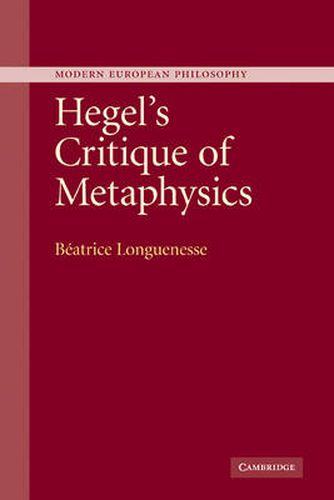Readings Newsletter
Become a Readings Member to make your shopping experience even easier.
Sign in or sign up for free!
You’re not far away from qualifying for FREE standard shipping within Australia
You’ve qualified for FREE standard shipping within Australia
The cart is loading…






Hegel’s Science of Logic has received less attention than his Phenomenology of Spirit, but Hegel himself took it to be his highest philosophical achievement and the backbone of his system. The present book focuses on this most difficult of Hegel’s published works. Beatrice Longuenesse offers a close analysis of core issues, including discussions of what Hegel means by ‘dialectical logic’, the role and meaning of ‘contradiction’ in Hegel’s philosophy, and Hegel’s justification for the provocative statement that ‘what is actual is rational, what is rational is actual’. She examines both Hegel’s debt and his polemical reaction to Kant, and shows in great detail how his project of a ‘dialectical’ logic can be understood only in light of its relation to Kant’s ‘transcendental’ logic. This book will appeal to anyone interested in Hegel’s philosophy and its influence on contemporary philosophical discussion.
$9.00 standard shipping within Australia
FREE standard shipping within Australia for orders over $100.00
Express & International shipping calculated at checkout
Hegel’s Science of Logic has received less attention than his Phenomenology of Spirit, but Hegel himself took it to be his highest philosophical achievement and the backbone of his system. The present book focuses on this most difficult of Hegel’s published works. Beatrice Longuenesse offers a close analysis of core issues, including discussions of what Hegel means by ‘dialectical logic’, the role and meaning of ‘contradiction’ in Hegel’s philosophy, and Hegel’s justification for the provocative statement that ‘what is actual is rational, what is rational is actual’. She examines both Hegel’s debt and his polemical reaction to Kant, and shows in great detail how his project of a ‘dialectical’ logic can be understood only in light of its relation to Kant’s ‘transcendental’ logic. This book will appeal to anyone interested in Hegel’s philosophy and its influence on contemporary philosophical discussion.